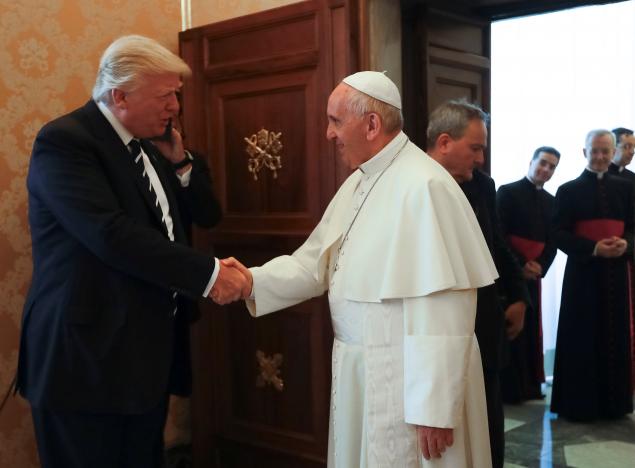Blessed are the peacemakers: the opportunities that exist for Pope Francis and Donald Trump

Today, as part of his first international tour, US President Donald Trump has met with Pope Francis in Rome. The juxtaposition of the two men couldn't be more stark in character, philosophy and style.
Yet there is perhaps a unique opportunity. As a leader of more than a billion Catholics around the world, approximately 70 million of whom live in the United States, Pope Francis is someone to be listened to.
President Trump's statements so far have traced some of the key fault lines of conflict in the Middle East - violent extremism, Saudi-Iranian strategic competition and the Israeli-Palestinian conflict. There is much that the Pope could have usefully said on each of these.
Here are three thoughts.
First, the President's speech in Saudi Arabia focused squarely on 'extremist ideology' as the source of violent extremism. The reality though is different and this is an important message. We increasingly know that ideology tends to come into play at a tipping point - the final decision to join violent groups. The reasons why people become drawn into such groups in the first place run far deeper. Fundamentally they tend to be about exclusion - economic, political and social – something that the Pope cited as "the root of all wars".
In Syria, studies have shown that young people have joined armed groups for a variety of reasons, in particular economic ones, with ideology having a smaller impact than previously thought. Meanwhile, young people in Tunisia, the largest contributor of foreign fighters to ISIS globally, are co-opted into such groups through a complex combination of social and political marginalisation (despite the role youth played in the revolution), mass unemployment and stigma.
Yemen, Mali, Iraq and northern Nigeria are all further examples of conflict born of exclusion, but that have now morphed into cradles of violent extremism. So it is essential that we also address persistent exclusion as a core driver of violence. When you consider that 93 per cent of all terrorist attacks between 1989 and 2014 occurred in countries with high levels of state sponsored terror (extra-judicial deaths, torture and imprisonment without trial, policies targeting religious freedoms and group grievances) this might be something to also consider, given the US's close relationship with Saudi Arabia and Egypt.
Second, turning to Iran, we must consider dialogue. Everyone knows Iran must be part of the solution to the conflicts in the Middle East. The best thing the US could do would be to begin to build bridges between Iran and Saudi Arabia (using its influence with the Kingdom) as the two key protagonists in the broader conflict unfolding in much of the region. If we want to avoid the contagion that has spread from Iraq to Syria and now increasingly through to Yemen spilling over into Central Asia and beyond, something must be done and soon, to bring these regional powers together. Containment, isolation, threats and words of fear will only see the prospects for peace in the region further retreat.
And third, there were very few tangible ideas from President Trump about how peace might be achieved between the Israeli and Palestinian peoples. So, perhaps the message here is not so much about what a roadmap might be but bringing a new underpinning to the process. For this the Pope can draw on his 2016 Peace Day message. In it, he calls for 'non-violence as a style for politics and peace'. It would be naive to think that either side can transform into Gandhi-esque agents of change, but it is a lens that others can bring to the process. The game of political elites trying to forge a grand bargain for peace has delivered little over the last 50 years. Perhaps it is time for an equal, if not greater effort to invest in peace, within and between communities, which may feed up and shape the peace process from within. That's not to say that work is not currently under way in this respect, but the balance of effort and focus remains on the high-politics of peace negotiations, and overlooks the reality that tensions and conflict are not just between Palestinians and Israelis, but also Palestinians and Palestinians, Israelis and Israelis. What the Pope describes as the 'domestic roots of a politics of nonviolence' is a strategy worth exploring.
The common message that transcends these three issues is neatly summarised once again in the Peace Day message: 'When victims of violence are able to resist the temptation to retaliate, they become the most credible promotors of nonviolent peacemaking…an ethics of fraternity and peaceful coexistence between individuals and among peoples cannot be based on the logic of fear, violence and closed-mindedness, but on responsibility, respect and sincere dialogue.'
After all, blessed are the peacemakers.
Julian Egan is Head of Advocacy at the peacebuilding organisation www.international-alert.org. Follow on Twitter @intalert











